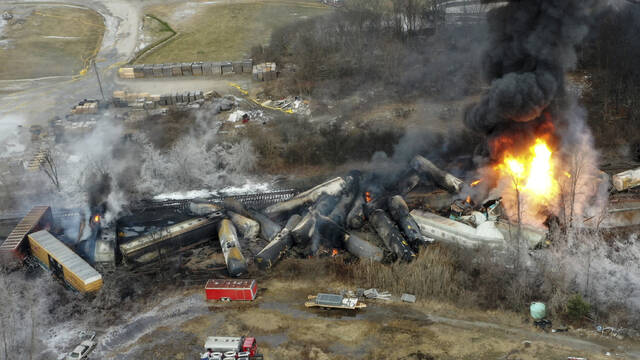The recent train derailment in East Palestine, Ohio, spewed toxic chemicals into surrounding neighborhoods. Since pollution knows no borders, this polluted air was carried to communities in Pennsylvania as well. Similar train derailments have occurred in other states since that time.
Tightening lax standards on the transportation of hazardous chemicals is certainly needed to protect public health, but we also need to look at where those chemicals are going. It’s clear that the building of more industrial plants using fossil fuels in the Ohio River Valley will raise the risk that many more families in Ohio, Pennsylvania and West Virginia will be exposed to toxic chemicals, taxing the region with higher health care costs and lowering the quality of life for virtually everyone.
Petrochemical plants like the Shell plastics cracker plant in Beaver County and the hydrogen hub now proposed in the region all require considerable amounts of gas feedstock. This means that a large number of gas wells will have to be drilled to fill the need. In the case of the Shell plant, for example, it has been estimated that 1,000 new wells will be needed every five to 10 years. The drilling of these additional wells will require somewhere between 4 and 6 million diesel truck trips to haul equipment and material, sometimes in the form of toxic chemicals, to the well sites.
Once the gas is delivered to the petrochemical plant, additional toxic chemicals are required to make the process work. By current law, operators are not required to disclose many of these chemicals to the public, and plant workers are often not informed about potential exposure to these toxic substances.
The gas wells and petrochemical plants themselves also create enormous quantities of solid and liquid waste that have to be put somewhere. On average, 160,000 gallons of waste is produced each day in just the first five days after a gas well is hydraulicly fractured. While this amount can decrease over time, it is still estimated a well can produce 1,100 gallons of liquid waste every day for anywhere between 10 to 30 years.
Both the materials going into petrochemical plants and the ones coming out are carried by train, truck or barge or by a vast network of pipelines that spiderweb the region. Accidents and spills occur with alarming regularity. Operator fines are frequent but act as only a slap on the wrist. There are no guarantees that what happened in East Palestine won’t happen in any number of other towns or cities across the region.
The health risks associated with gas wells and petrochemical plants cannot be overstated. Some families living near shale gas wells, for example, have reported that they cannot drink the contaminated well water coming out of their taps or use this water for bathing because it causes skin rashes and other health issues.
If eyewitness accounts aren’t enough, consider this: More than 30 epidemiological studies — the gold standard of environmental research — have shown correlations between living near oil and gas development and a host of adverse health issues. Health impacts include asthma and other respiratory complaints, hospitalizations for heart failure and mortality from heart attacks, low birth weights and intellectual and developmental disabilities, congenital heart defects, and mental health symptoms. Waste from shale gas operations has been found to contain both toxic chemicals and radioactive substances, making people living nearby prime candidates for cancer.
Creating a petrochemical and hydrogen hub in the region will only lead to more health impacts for residents, many of whom already live in areas with a high concentration of low-income, minority and other under-resourced populations. It will also require billions of taxpayer dollars, the people’s money, to subsidize industry that will increase greenhouse gas emissions, worsen climate change and bring in miles upon miles of new pipelines. The little information that is publicly accessible about two proposed hydrogen plants fails to mention public health safeguards and or even acknowledge that fugitive emissions will be a challenge.
Our state and local policymakers must take public health into consideration when making decisions about the siting of these plants — or whether they should even be built in the first place. At the very least, residents must be involved in a transparent process that gives them more input into decisions that affect their health and the health of their families and neighbors. The public must be made aware of the specific toxic chemicals being transported through their neighborhoods or used in local industries. The costs to residents’ health and well-being are too great to ignore this any longer.
Sen. Katie Muth represents District 44, parts of Berks, Chester, and Montgomery counties, and serves as chair of the Senate Democratic Caucus Policy Committee, minority chair of the Senate Veterans Affairs and Emergency Preparedness committee, and member of the Senate Environmental Resources and Energy Committee. Alison L. Steele is executive director of the nonprofit Environmental Health Project, which works to defend public health in the face of oil and gas development.








